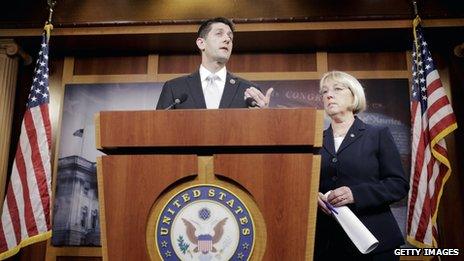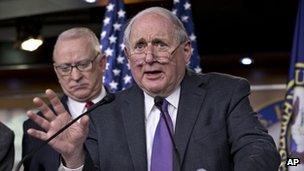Senate passes two-year cross-party budget bill
- Published

Senator Patty Murray (right) and Congressman Paul Ryan (left) were picked to head a cross-party budget committee in the wake of an October government shutdown
The US Senate has passed a two-year federal budget bill by 64 votes to 36 in a rare outbreak of fiscal deal-making on Capitol Hill.
The legislation, which would avert a government shutdown in January, sailed through the Republican-held House of Representatives last week.
The proposal was drafted by a cross-party budget committee set up after October's 16-day government shutdown.
Republicans and Democrats are unpopular after a year of congressional inaction.
The year 2013 has seen political gridlock over President Barack Obama's healthcare law, the federal debt limit and issues ranging from immigration to gun control.
'Nothing written in stone'
The budget bill must still be signed into law by the president.
Congress will then have until 15 January to pass a $1.012 trillion fiscal spending bill for 2014.
Democratic Senator Patty Murray, co-writer of the legislation, said: "This bipartisan bill takes the first steps toward rebuilding our broken budget process.
"We've spent far too long here scrambling to fix artificial crises instead of working together to solve the big problems we all know we need to address."
But any hopes that a new era of cross-party unity could be dawning on Washington DC may be premature.
"This is a budget," Democratic Senator Carl Levin told reporters on Tuesday. "A budget could be amended next year. Nothing is written in stone around here."

Senator Carl Levin has warned the budget bill might face challenges if passed into law
The Senate's top four Republicans - who are in the minority in the upper chamber - voted on Tuesday to block consideration of the budget bill. However, their opposition was seen as mainly symbolic and it is thought they knew the bill would ultimately go forward.
But the chamber's Republican leader hinted a separate brawl could lie ahead over the government's borrowing limit, which is due to be raised next spring.
"I doubt if the House, or for that matter the Senate, is willing to give the president a clean debt ceiling increase," Senate Minority Leader Mitch McConnell told reporters.
"We'll have to see what the House insists on adding to it as a condition for passing it."
The bill aims to shave up to $23bn from the nation's $642bn annual budget deficit.
It also rolls back $63bn in military and domestic spending cuts automatically imposed in January when Democrats and Republicans failed to reach a budget compromise.
Republican 'retreat'
Democrats supported the measure even though they were unhappy that it did not extend long-term unemployment benefits that are due to expire for nearly 1.3 million Americans later this month.
And members of both parties voiced disapproval of the bill's provision to cut inflation increases to pensions for military retirees under the age of 62.
Republican Congressman Paul Ryan, chairman of the House budget committee, said last week the budget deal "cuts spending in a smarter way".
But one Republican senator, who spoke to the BBC under condition of anonymity, said the budget deal was "very much a retreat" for his political party.
"I think they set it up as it's either this or a shutdown, but I think that's a false choice," he said. "I really think it can't get enough criticism."
- Published18 December 2013
- Published13 December 2013
- Published11 December 2013
- Published17 October 2013
- Published17 October 2013
- Published17 October 2013
- Published9 October 2013
- Published8 October 2013